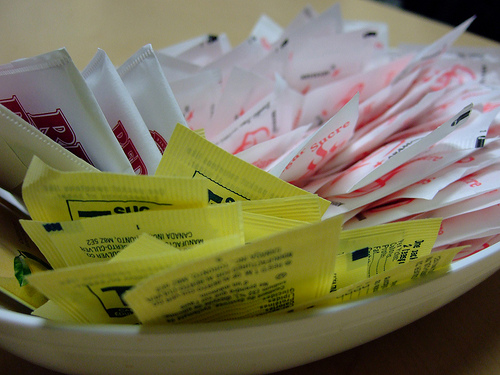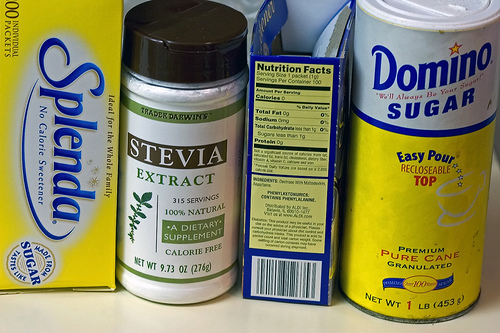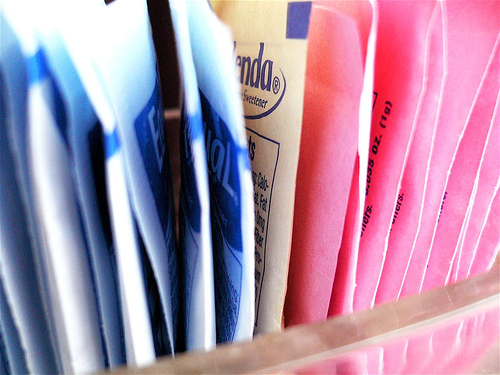All about sweeteners

There are a lot of sweeteners on the market today. It's confusing for me, and I deliberately go out of my way to keep on top of the sweetener market.
Sugar
AKA: Cane syrup, organic cane syrup, beet pulp juice
Sugar is still the OG when it comes to sweeteners. High in calories, high in deliciousness, high in causing the insulin spikes that can lead to metabolic imbalances and Type 2 diabetes.
Sugar in the Raw
AKA: turbinado, It's just sugar, okay?
The only difference between sugar and this brown granular crystal form of sugar is marketing, basically. The crystals are a little larger and it has a slightly stronger molasses flavor. And it doesn't dissolve very well into an iced Americano. Other than that, it's just plain old sugar.
Honey
Although it has the patina of wholesomeness, honey is just sugar that was made by bees instead of an industrial pulp mill. Raw local honey is straight up delicious and smells like a balmy late spring afternoon, but nutritionally speaking, honey isn't any better (or worse) for you than sugar.

Image courtesy Flickr/DeathByBokeh
Agave Nectar
This is an industrial product that has done an excellent job of positioning itself on the market. Agave nectar is basically high fructose corn syrup made from the root of the agave plant. It is created via the same process, but has even more fructose than high fructose corn syrup. If you wouldn't eat HFCS, then you should not eat agave nectar.
Stevia
AKA: Truvia
Long hailed as the savior of the dieter with a sweet tooth, stevia has finally come to the market and… it's okay, I guess. It is a natural sweetener which has no calories, which makes it attractive in the abstract. People seem to like it, but I find it has a metallic taste, like ammonia mixed with the taste of aluminum.
Acesulfame potassium
AKA: Ace-K
In the United States you most often encounter Ace-K in diet soft drinks blended with other artificial sweeteners. It tastes pretty bad on its own, but it seems to blend in well enough with other ingredients.

Image courtesy Flickr/Amyvdh
Aspartame
AKA: NutraSweet, Equal, the blue packet
This is one of the most contentious chemicals found in our food today. Although it has been proven safe and non-toxic over and over again, for some reason a segment of the population insists that it just has to be bad for you, some way, somehow. I find it tastes a little bitter, and has since been eclipsed by better artificial sweeteners. But at the time it was released, it was a ground-breaking change.
Sucralose
AKA: Splenda, the yellow packet
This zero-calorie artificial sweetener does not break down under heat, which makes it useful for baking. Out of all the artificial sweeteners, this is the one that tastes least bad to me.
Saccharin
AKA: Sweet 'N Low, the pink packet
Saccharin is one of the oldest artificial sweeteners on the American market. It was first discovered in 1878 by a chemist who was playing around with things you could make out of coal tar. (Yum.) It earned a bad reputation in the 70s when lab tests seemed to indicate that it was carcinogenic. It has since crept back into our food because it turns out that pretty much everything is carcinogenic, and whatever, who cares.
Monk Fruit Extract
AKA: Nectresse
This is the new hotness when it comes to low-calorie sweeteners. Monk fruit are grown in rural China, and the juice of the fruit has been used as a low-calorie sweetener there for several hundred years. The manufacturers of Splenda have recently hopped on the monk fruit bandwagon and their new sweetener Nectresse is poised to flood the market. I haven't tried it, although I did sign up to receive a free sample in the mail.
Sugar Alcohols
AKA: maltitol, mannitol, sorbitol, xylitol, erythritol
These low-calorie sweeteners taste pretty darned good. Too bad they give me the wicked trots, even when eaten in only very small amounts. I'm not alone in that reaction, either. It's a shame, because they really do a great job of sweetening candies and other treats.
Erythritol
This sugar alcohol apparently does not cause the same "digestive upsets" as its cousins. But I still avoid it whenever possible, because my experience with other sugar alcohols has been so terrible.
Main image courtesy Flickr/Digitalnative

1 comments